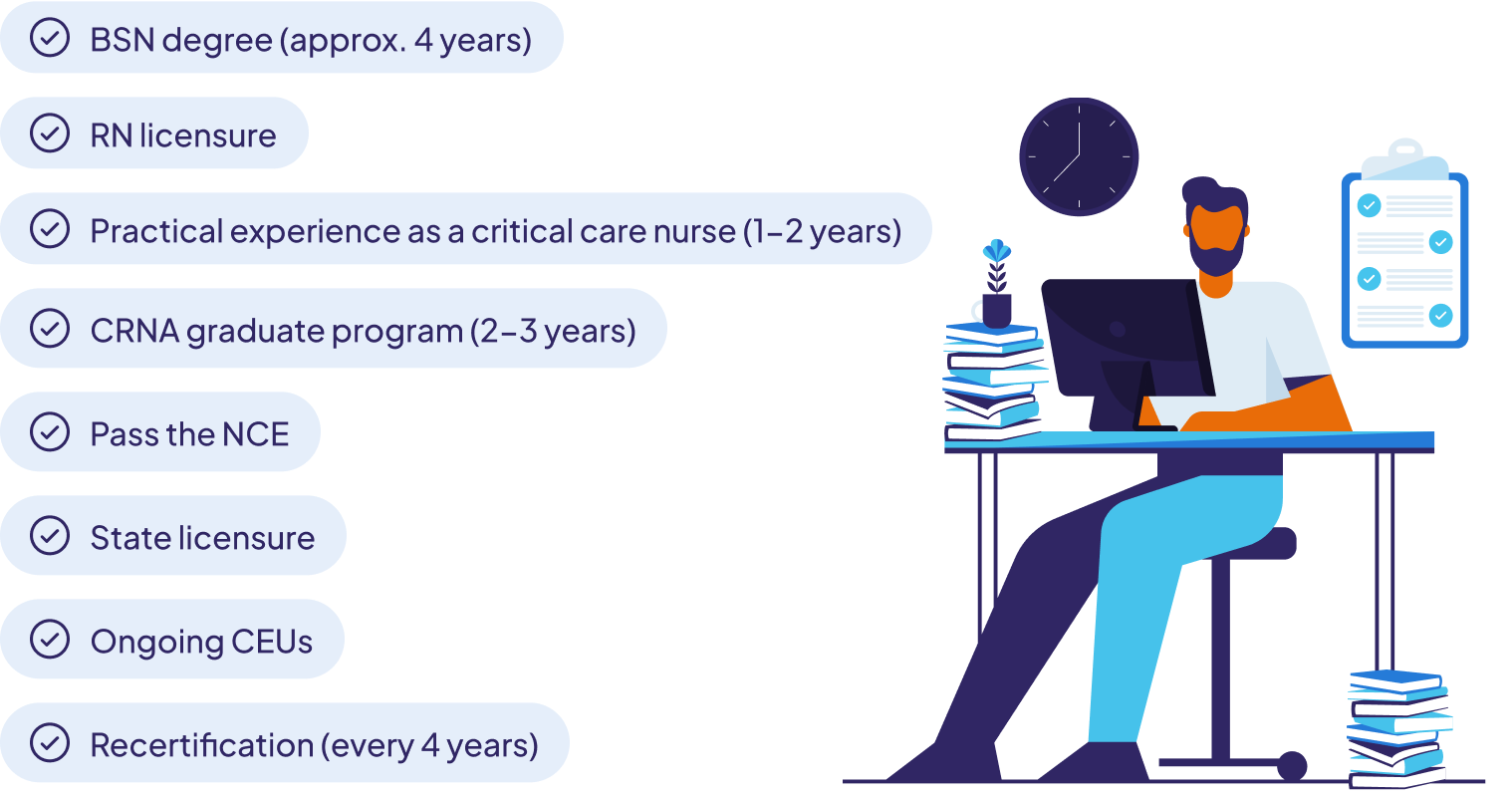Recent Posts
Most Popular
Become a CRNA: High Demand, Great Pay (2024 Guide)

Summary
- The role of a CRNA varies across the diverse healthcare settings in which they serve, but typically involves administering anesthesia, monitoring patients during and after surgical procedures and making critical decisions that affect health outcomes.
- Becoming a CRNA requires an extensive educational experience, which includes a BSN, practical critical care experience, the completion of a graduate program, the passing of the national certification exam and state licensure.
- It is reported that CRNAs earn an average annual salary of more than $200,000, solidifying these providers as some of the highest earners among nursing professionals.
- The aging U.S. population and projected healthcare workforce attrition is driving the demand for CRNAs, with the field estimated to experience an impressive ~40% growth rate by the year 2032.
So, you want to become a certified registered nurse anesthetist (CRNA)?
The role of CRNAs stands out as a vital and growing specialty reflecting the evolving landscape of healthcare delivery. Factors including the nation’s large aging population, the need for increased surgical procedures and a heightened emphasis on a team-based approach to care have driven the demand for CRNAs in a consistently upward trajectory, thus creating new opportunities for register nurses (RNs) to advance their careers.
According to the American Association of Nurse Anesthetists, CRNAs administer more than 50 million anesthetics annually in the U.S. This crucial contribution reflects the increasing demand for these highly specialized practitioners — one that is projected to experience an impressive ~40% growth by 2032, according to the Bureau of Labor Statistics.
“The path to becoming a CRNA is certainly demanding. It is rigorous and requires an immense amount of dedication. However, experiencing the positive impact I have on my patients’ surgical journeys, especially in critical situations, makes every challenge worth it. I feel privileged to have these opportunities to make such massive impacts on patient care every day.”
While becoming a CRNA can be an exciting and rewarding prospect, it is crucial that RNs employ a thoughtful strategy when preparing to take this next step in their careers. Here, I’ll share details about the experience and education you need, and the benefits you can expect as a practicing CRNA.
The role of a CRNA
During my career, I’ve found that successful CRNAs possess a dynamic blend of clinical expertise and sound decision-making. Their flexibility, adaptability and leadership potential are evident in the diverse roles they fill and the various locations they serve.
- Work Settings: CRNAs are vital members of anesthesia teams who operate primarily within hospitals or surgical facilities. Outside of a hospitals, CRNAs might also practice in clinics, medical offices or military bases. While they often collaborate closely with surgeons and anesthesiologists, they also operate independently, particularly in under-resourced environments. In rural hospitals, CRNAs may find themselves as the sole anesthesia practitioners. One great way to get a sense of available opportunities is by creating a free account on DocCafe and searching job openings across various settings.
- Leadership: Due to the versatility and complexity of their training, CRNAs often assume leadership roles. They commonly manage and coordinate anesthesia teams or are solely looked upon to make critical healthcare decisions for patients.
- Scope: Individual state regulations vary and dictate whether a CRNA can have full autonomy or must work under physician supervision. In some states, CRNAs can establish and maintain individual practices.
“A typical day for a CRNA can fluctuate, but they can always expect to make critical decisions that will directly affect the health outcomes of the patients they encounter.”
Some regular duties for practicing CRNAs include:
- Pre-operative preparation
- Anesthesia administration
- Intra-operative observation
- Post-operative care
- Emergency response
- Pain management
Benefits and rewards
Once I chose to advance my career by becoming a CRNA, the personal and professional benefits of the profession became evident very quickly. Some of them included:
- High Pay: Due to the specialized nature of the role, CRNAs are among the highest paid nursing professionals in the country.
- Independence: CRNAs are often allowed autonomy in making critical decisions regarding their patients’ care plans.
- Opportunity: CRNAs accumulate vast training during their careers, affording them flexibility in their work environments.
- Satisfaction: The vibrant nature of the CRNA role contributes to high levels of personal and professional satisfaction among practitioners.
How to become a CRNA: Beyond the basics
“Approximately 7-10 years of education and training are required to become a practicing CRNA. This intensive pathway serves to prepare clinicians for the highly specialized care they will provide their patients.”

Having clear expectations of the prerequisites helped me navigate the process and plan accordingly. I always suggest CRNA students educate themselves at the onset, to ensure all the fundamental requirements are achieved successfully.
- Earn a BSN Degree: Earning a Bachelor of Science in Nursing (BSN) degree is the first step toward becoming a CRNA. This initial training and licensure to become an RN covers practical coursework and includes clinical rotations across various healthcare settings.
- Obtain RN Licensure: BSN graduates must next pass the NCLEX-RN exam, which tests clinical knowledge and critical thinking, to obtain licensure to practice in their states. RNs must maintain an active license throughout their careers.
- Accrue Experience: Before applying to a graduate CRNA program, RNs must first possess practical and real-world experience in a hospital setting. All CRNA programs require a strong foundation in critical care nursing, so candidates should prioritize clinical work to include at least one year in intensive care units or emergency rooms.
- Complete a Graduate Program: Typically lasting 24-36 months, a master’s- or doctoral-level CRNA program is necessary to become a practicing CRNA. With more than 150 programs across the country, competitiveness varies but often requires high GPA and GRE scores, ICU experience and strong recommendations. When choosing an institution, be sure that it is included on the Council of Accreditations list. It is also important to note that as of 2025, prospective CRNAs will be required to earn a doctorate degree.
- Pass NCE: After successfully completing a graduate program, CRNAs must sit for the National Certification Exam (NCE) administered by the National Board of Certification and Recertification for Nurse Anesthetists. This test focuses on anesthesia knowledge and clinical judgment. The certification must be maintained throughout a CRNA’s career and requires the completion of ongoing education credits. CRNAs must also pass the recertification exam every four years.
Do you need a doctorate to become a CRNA?
The simplest answer to this question is not yet — but future CRNAs will.
Beginning 2025, new CRNAs will be required to earn a doctorate degree as part of their graduate training. However, CRNAs who hold a master’s degree before 2025, like me, will be exempt from this requirement and will be grandfathered in. This shift is following a trend in other specialties that are making permanent moves toward doctorate-level degrees for entry into the profession.
“Many healthcare practices are recognizing the need for more refined educational requirements as more complex cases arise. As such, those in the early stages of their CRNA career who hold master’s degrees might consider pursuing a doctorate to enhance their competitiveness in the workforce.”
CRNA program interview questions
During a CRNA graduate program interview, candidates must be prepared to navigate a series of questions that serve to assess their clinical knowledge, critical thinking skills and personal attributes. Here are some common questions that may come up in interviews.
- What is your educational background?
- What is your experience in critical care nursing?
- What is an example of a difficult situation you’ve experienced in your career? How did you manage it?
- Why did you choose this program?
- What do you believe are essential traits of a successful CRNA?
“In addition to being well-prepared for interview questions, candidates should offer stories and examples that demonstrate their personal clinical knowledge and critical thinking. Doing so will highlight their motivation and help them stand out among the crowd.”
CRNA licensing compacts
As every state has its own board and requirements, a CRNA traditionally needs to get an individual license for every state they work in. However, more than 30 states now participate in the Nurse Licensure Compact (NLC), allowing RNs to use just one license across multiple states.
Similarly, the Advanced Practice Nurse Compact provides a multistate license specifically for CRNAs and has been adopted by 13 states as of 2023. Using compacts can be especially helpful for locum tenens CRNAs, as they remove administrative hurdles and can help streamline application processes.
Work-life balance for CRNAs
“These fast-paced environments coupled with long-hours and challenging caseloads necessitate proactive strategies. While we shouldn’t expect to achieve perfect balance every day, we can and should work to create a sustainable rhythm that allows us to thrive both personally and professionally.”
Aligning work demands with the requirements of daily life requires extra effort for many healthcare providers, including CRNAs. At work, I’ve employed various tactics, including using advice from seasoned CRNAs, taking advantage of workplace wellness programs, rotating call duties, if possible, and exploring flexible scheduling options. At home, I often practice relaxation techniques, engage in regular exercise and plan quality time with family and friends. All of these are good ways to ensure a healthy work-life balance.
Considerations for becoming a traveling CRNA
Much like the need for permanent placement CRNAs, the demand for locum tenens CRNAs is increasing rapidly. Latin for the term ‘to hold the place of,’ locum tenens advance practice providers travel to different locations to provide care on contract. Assignment lengths and pay vary across locations, but these contracts typically pay very well and offer clinicians exciting opportunities to practice in new settings with the flexibility to choose how often to work.
What’s more, locum work can be incredibly gratifying when considering that many of these assignments often provide life-saving care to those in desperate situations. DocCafe has partnered with Aya Locums to offer these unique travel opportunities to CRNAs. You’ll typically need at least one year of experience for these roles, with some facilities requiring more.
Uncovering CRNA stats and trends
During my time as a CRNA, I’ve witnessed an unprecedented surge in demand across the profession. According to the U.S. Bureau of Labor Statistics, a nearly 40% job growth is projected for the field by 2032.
“Because the role and training of CRNAs are so unique, they can quickly fill in gaps across multiple segments within the healthcare arena — even those in the most challenging settings. Due to this adaptability, qualified CRNAs have become highly sought after across the country.”
The explosive growth across the specialty can be largely attributed to our aging population — an issue that is two-fold. Just like the patients they serve, a large segment of the healthcare workforce is reaching retirement age. Likewise, there is an increasing need for surgical procedures amongst the growing baby-boomer population.
- Aging Workforce: The American Nurses Association projects that by 2030, one million registered nurses will reach retirement age. Additionally, more than two of every five active physicians in the United States will be 65 or older within the next decade, according to the American Association of Medical Colleges.
- Shifting Patient Demographics: Driven by those born between 1946 and 1964, the population of Americans aged 65 and older is expected to reach more than 80 million by 2050, according to the Population Reference Bureau. This represents a 47% increase in this segment from 2024.
- Increased Demand: Due to the increase in our aging population, a report from the Annals of Surgery predicts significant increases in procedures by as much as 47% across all surgical fields, though they could widely vary by specialty.
The combined effects of attrition and the expanding need of surgical procedures continue to position CRNAs at the forefront of healthcare delivery. This notion is supported by recent statistics surrounding earning potential and employment opportunities, which underscore the significance of choosing this field as a viable career.
Becoming a CRNA FAQs
FAQ 1: What are the steps involved in becoming a CRNA?
The journey to become a CRNA involves several key steps. These include obtaining your BSN, becoming a licensed RN, accumulating critical care experience, completing a graduate CRNA program, passing the national certification exam and obtaining your state licensure.
FAQ 2: How long does it take to become a CRNA?
The timeframe to become a licensed and practicing CRNA varies but is typically around 7-10 years.
FAQ 3: What are the different practice settings for CRNAs?
CRNAs enjoy a diverse range of practice settings, offering flexibility and career customization. Some of the most common environments include hospitals, surgical centers, pain clinics, physician offices and military bases.
FAQ 4: What are the salary expectations for CRNAs?
According to the U.S. Bureau of Labor and Statistics the median salary for CRNAs in 2023 was $214,00. Salary can vary based on factors like experience, location and practice setting.
FAQ 5: What are the continuing education requirements for CRNAs?
CRNAs are required to complete 100 hours of continuing education every four years to maintain their national certification and state licensure. However, they are also committed to lifelong learning to maintain their career competency.
FAQ 6: What are the career advancement opportunities for CRNAs?
Outside of clinical practice, CRNAs can find employment opportunities in education, leadership, research and entrepreneurial capacities.
FAQ 7: What personal qualities are essential for success as a CRNA?
Thriving as a CRNA requires a unique blend of qualities including strong skills in critical thinking, problem-solving, communication and collaboration. They must also possess compassion and empathy and be well practiced in critical care and clinical settings.
FAQ 8: What are the biggest challenges CRNAs face in the workplace?
While rewarding, the CRNA profession presents certain challenges such as managing demanding schedules, advocating for CRNA practice rights and maintaining a healthy work-life balance.
FAQ 9: Are a master’s degree or doctorate program required to become a CRNA?
Yes. Currently, either an MSN or DNP program qualifies you to become a CRNA, though the specific requirements may vary. However, in 2025, all incoming CRNAs will need to successfully complete a doctorate-level program to practice.
FAQ 10: What resources are available to help me on my journey to becoming a CRNA?
Several valuable resources can support you throughout your journey. Take the time to explore the American Association of Nurse Anesthetists and the National Board of Certification and Recertification for Nurse Anesthetists. Also connect with admissions departments of nurse anesthesia programs and seek mentorship from experienced CRNAs.
Search CRNA Jobs NowEmbracing your career choice
The CRNA occupation stands out as a beacon for healthcare providers seeking a dynamic, fulfilling and impactful career. While this complex journey is often marked by challenges, you can also expect to experience immense growth and rewards throughout. I hope this information will help you confidently embark on your professional path and if you’re ready, I encourage you to create your free profile with DocCafe today to start searching for your next big opportunity.
All information, discussions and opinions contained within this blog or otherwise on the website or any linked materials (“the “Blog Content”) is for general informational purposes only. All Blog Content is based on the author's opinions and experiences and is not necessarily representative of our opinions as an organization. It should not be considered as tax/financial advice, legal advice, compliance advice, health advice or other professional advice and does not constitute the practice of any medical, nursing or other professional healthcare advice, diagnosis or treatment or provision of legal services. You should seek professional assistance for any concerns or issues. If you or any other person has a medical concern, you should consult with your healthcare provider or seek other professional medical treatment immediately. While we strive to provide accurate and up-to-date information, we make no warranties or representations regarding the completeness, reliability, or accuracy of the Blog Content. Your use of the Blog Content is solely at your own risk and we will not be liable for any damages or losses arising from the use of, or reliance on, any Blog Content.





 Brant Langlinais
Brant Langlinais

Comments